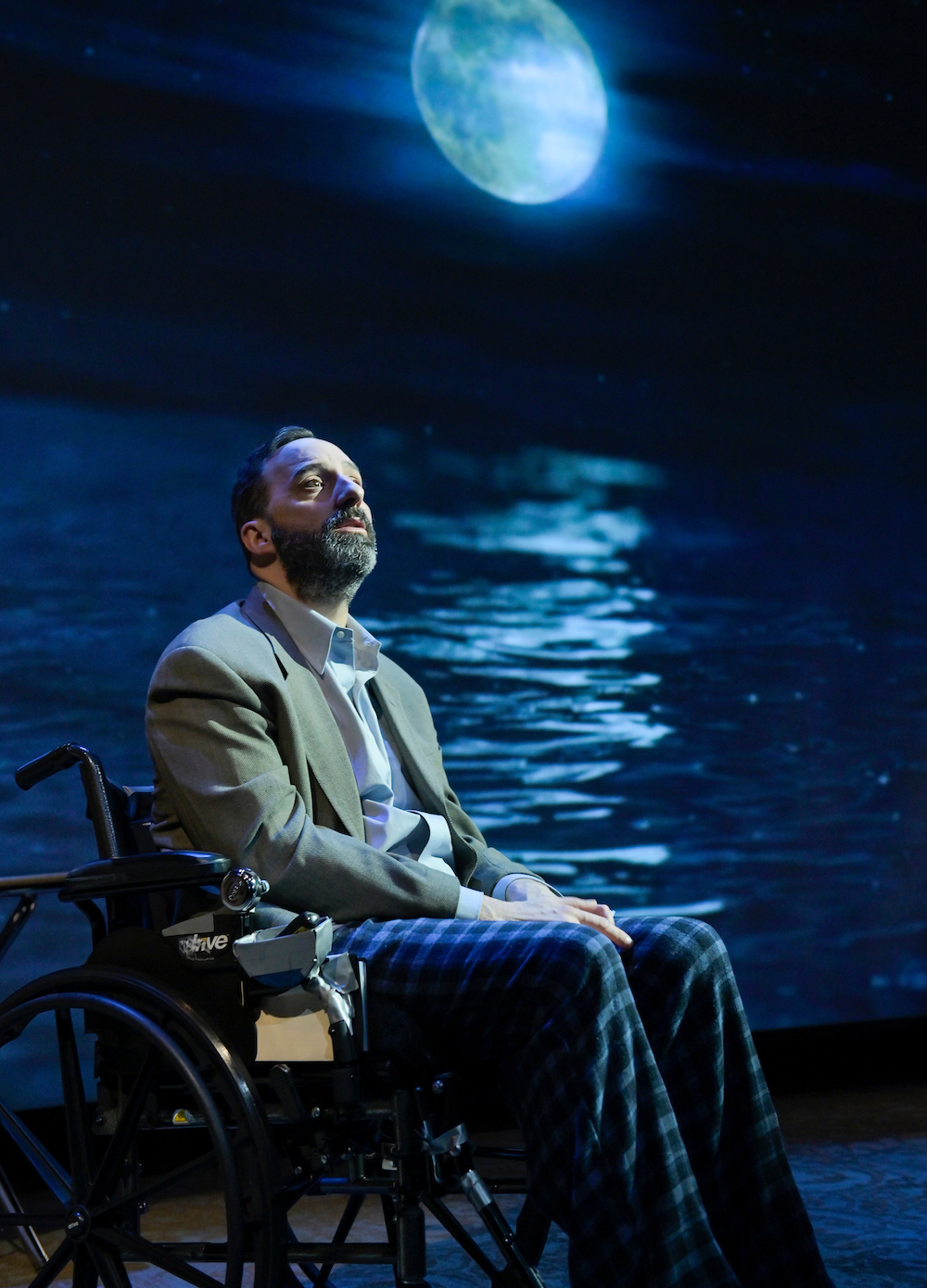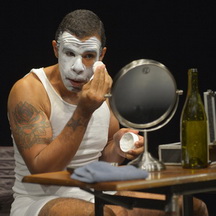Up until its last minutes Wakey Wakey is a monologue. A man in a wheelchair sits in the middle of a stage fitted out to look like an institutional setting, could be a school, could be an empty Elks club, could be a hospital. And he talks to us, the audience. Or rather, he meanders and we are his witnesses, his silent conversationalists.
It’s understandable why A.C.T. might have been drawn to stage Will Eno’s Wakey Wakey. It’s about a man who is dying and in those hours before his death searches through his past and present to find some sort of meaning, something that will allow him to die in less than futility.

It’s a subject that has long made for riveting theater. And Eno’s instinct to make the situation a monologue rather than an ensemble makes absolute sense. It does, however, force the playwright’s hand. The language, the movement of the play, the humor or lack of it, must all be exceptional.
It also forces the actor and the director’s hand.
A kind of dank absurdist humor seemed to be the overall tone of the production, though it was brightened up by what could be considered upbeat special effects, which fell clumsily into the sentimental. At one point the man, named Guy, you know, a guy, an everyday Everyman, asks us to watch a series of photos projected on the back set (projections designed by Leah Gelpe). They are meant to be windows into his past and earliest familial memories and they are presented in a theatrical way as if in a curtained movie theater, or on the stage in a community building. The projections begin with babies, toddlers, young people, each swathed in the appropriate Kodachrome palette of the time, a little yellow, a little blurry. Later in the play, there are projections of meercats standing and moving in their hyperalert human-crossed-with-a-cute-gopher way. As Guy says, to the first, and we all say to the second, “Awww.”
Indeed.
I’m not saying that humor and irony can’t address the subject of death, only that the humor needs to be exceptional because, after all, haven’t we heard most of these jokes in one form or another? Haven’t we seen these theatrical tricks before? The breaking of the fourth wall, the playing with the confidentiality of the audience?
Beyond that it’s clear that Eno is attempting to follow the tradition of Beckett, Albee and Ionesco, but he lacks their bite, their outrage, their sullen confrontation of the social and political idiocies of their milieu. Wakey Wakey slithers too easily into the tepid. There is only one point in the play when the production reaches into the darkness implicit in the subject: when a series of images of animals screaming is projected across the upstage screen. As the terrified portraits continue, including that of a singer, you can feel these creatures’ pain lodge in your heart. And then the images and the feelings they invoke pass, disappearing willy nilly.
Hale also stumbles in this role. He’s clearly an excellent actor, he was able to make the script seem spontaneous and off-the-cuff, following its lack of conclusions with a casually contemplative cool. But the range of emotions he displayed was confined mostly to irony. And he never embodied the unrelenting closing down of the self that death inhabits us with. Without that undercurrent of fatality the unending monologue lacked grit, and eschewed the inevitably of horror and pain.
Director Amy Kaufman also chose to face the questions offered by Eno in an odd way. Guy’s death is met with balloons falling from the flies and bubbles dancing lightly across the stage. Just the sort of thing that gives California a bad name.
The evening started with a short play by Eno titled The Substitution. It struck closer to what Wakey Wakey may have hoped to achieve. In the playlet a substitute teacher holds forth in front of four bored and fractious students. She’s supposed to be teaching a Drivers Education class but somehow she has prepared for a class on deep time. Kathryn Smith-McGlynn plays the teacher who has trouble spelling her own name. It’s a snappy little absurdist piece and more fun than a barrel of meercats.
– Jaime Robles
Wakey Wakey continues at A.C.T. through February 16. For tickets and information, visit act-sf.org.
